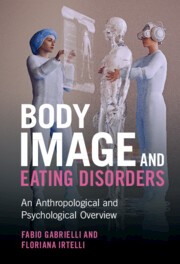Book contents
- Body Image and Eating Disorders
- Body Image and Eating Disorders
- Copyright page
- Contents
- Acknowledgments
- Part I Contemporary Perspectives in Anthropology, Philosophy, and Psychology on the Human Body: An Introductory Overview
- Part II Brain without Body, Body without Brain, and Contemporary Body Image Disorders
- Part III The Hypermodern Contradictory Relationship with Food
- 6 Contemporary Social Trends Regarding Food: Paradoxes and Food Tribes
- 7 A New Disorder: Orthorexia
- 8 Contemporary Perspectives on Anorexia
- 9 Nervous Bulimia and Binge Eating Disorder
- 10 Contemporary Perspectives on Obesity
- Part IV Which Possible Horizons? Some Final Considerations
- References
- Index
6 - Contemporary Social Trends Regarding Food: Paradoxes and Food Tribes
from Part III - The Hypermodern Contradictory Relationship with Food
Published online by Cambridge University Press: 26 May 2022
- Body Image and Eating Disorders
- Body Image and Eating Disorders
- Copyright page
- Contents
- Acknowledgments
- Part I Contemporary Perspectives in Anthropology, Philosophy, and Psychology on the Human Body: An Introductory Overview
- Part II Brain without Body, Body without Brain, and Contemporary Body Image Disorders
- Part III The Hypermodern Contradictory Relationship with Food
- 6 Contemporary Social Trends Regarding Food: Paradoxes and Food Tribes
- 7 A New Disorder: Orthorexia
- 8 Contemporary Perspectives on Anorexia
- 9 Nervous Bulimia and Binge Eating Disorder
- 10 Contemporary Perspectives on Obesity
- Part IV Which Possible Horizons? Some Final Considerations
- References
- Index
Summary
The neoclassical model of consumer behavior can no longer completely explain today’s spending and consumption processes, which reveal a preponderance of irrational elements that are mostly linked to the individual affective sphere. This behavior can also be applied to food purchase; indeed, in recent years, consumption is no longer experienced as a private and personal act, but increasingly as a social event. It can therefore represent an opportunity to experience a set of intense emotions that encourage the creation and development of specific social groups. This dynamic can explain the appearance of so-called food tribes on which this chapter provides an overview. In parallel, the chapter focuses on some contemporary paradoxes. For example, on the one hand, TV programs and other media simultaneously encourage us to invest in fitness courses, slimming diets, and miraculous products for weight loss, while inundating us with adverts and books focusing on tasty or sumptuous food items which encourage us to eat and experiment with new recipes and try an ever greater variety of delicious foods. Thus, the imperative to lose weight meets the temptation to overeat, inviting many people to oscillate metaphorically between anorexic and bulimic tendencies. Which are the consequences of such conflicting messages? How does the food tribe phenomenon correlate with such paradoxes? Theories and scientific studies about this topic are presented.
- Type
- Chapter
- Information
- Body Image and Eating DisordersAn Anthropological and Psychological Overview, pp. 79 - 87Publisher: Cambridge University PressPrint publication year: 2022



